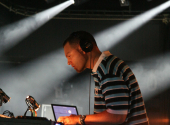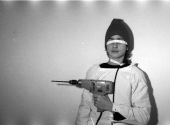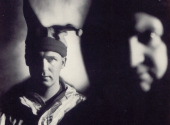
Milestones in Music History #35: Germs, Ugly and Dirty
The journey of musical experimentation undertaken by Manuel Göttsching and his Ash Ra Tempel, which we talked about in our last episode, acted as a stabiliser for avant-garde music, and at the same time was the driving force behind new ideas and new stimuli. Simultaneously, American society in the mid-1970s changed radically and the poorer classes tried to make their way tooth and nail – or with distorted guitars and screams. The latter was the case of probably the most brazen and unsympathetic band in the entire history of music. Today we're speaking about Darby Crash and the Germs.
Darby Crash wasn't always Darby Crash: Jan Paul Beahm was born on September 26, 1958, in Baldwin Hills Hospital. His family lived in Venice, Los Angeles, and he grew up and spent his youth in California, first in Culver City, then in West Los Angeles. His bad luck haunted him from early childhood, as his older brother died of a heroin overdose at age 27 and he never knew his father.
Even his relationship with his mother was not the happiest, as she suffered from mental problems and came to have violent and uncontrolled reactions. As a child, Jan Paul attended a very particular school, the Innovative Program School, which combined elements from Scientology and notions from Erhard Seminars Training.
This "est" was a training intended to help develop free minds, but from the mid-1970s began to be seen as an element of mind control and associated with cultic characteristics. Furthermore, in this type of training, students could create classes as they wanted. And this is how Jan Paul first met Georg Ruthenberg, more commonly known as Pat Smear (they created a class called Fruit Eating, so as an activity, they would go to the market for an hour to eat fruit and then go back to school).
Beahm and Ruthenberg also began to make heavy use of LSD during this period. They began to have subversive and manipulative behaviour toward other students, so in 1976 they were expelled from school. And so, the two started to form a band. The main models they were inspired by were groups like The Stooges or The Runaways. They initially chose "Sophistifuck" as their name, which then changed into "Sophistifuck and the Revlon Spam Queens".
Also, they placed an ad in a newspaper, looking for two untalented girls to join their band. The call was answered by Terri Ryan, who then assumed the name of Lorna Doom, and on drums, Belinda Carlisle, baptised as Dottie Danger. Dottie suffered from a long stroke of glandular fever so was quickly replaced with Becky Barton (although Dottie would later become very successful as the leader of the girl group The Go-Go's). With Becky Barton, also known as Donna Rhia, the new band now known as Germs recorded their debut single in 1977, "Forming".
The song was recorded in Pat Smear's garage and released on What? Records, and represented the first punk song of the Los Angeles scene. The back cover bore the statement, inserted by the record company at the expense of the band, that "recording may cause ear cancer". It is an incisive, ferocious, fast and instinctive song, which abruptly revealed the distinctive brand of the band.
Jan Paul appeared as Bobby Pyn, the first nickname of his career. The song, according to Bobby, was about dismantling the government and creating a new one. If not in politics, at least in music, he had found his expression. Later that year in August the band made their debut at a show hosted by fellow punk band The Weirdos.
And immediately after his debut, Bobby Pyn became Darby Crash, due to news found about a road accident, where a certain Darby had died of a car crash. The group made its way to Los Angeles and gained fame for Darby's over-the-top performances. Aside from his continually altered mental state, due to which he could rarely finish songs (and in many cases not even sing).
During their concerts Darby usually yelled at the audience, insulted them, spat and threw things. The audience, on the other hand, responded with violent gestures, spat and painted the singer's forehead with permanent markers – a total frenzy. The following year, the band released their second effort, the Lexicon Devil EP.
The band's promotional plan involved the use of Nazi iconography, accompanied by the slogan "Six million Jews can't be wrong". However, Slash Records rejected the idea, even though the cover was kept, featuring a painting of Nazi propaganda by Hubert Lanzinger from 1935, which depicted a glorified Hitler.
It was an EP consisting of three songs. "Lexicon Devil", according to Crash, was written from the point of view of Adolf Hitler; a crooked ballad, where mind control was exercised through the power of spells and images described in the song.
The second track was "Circle One", which I would call Beahm's intellectual manifesto and where for the first time he appeared as Darby Crash. The lyrics go like this: "I'm Darby Crash / A social blast / Chaotic master / I'm Darby Crash / Your meccas gash / Prophetic stature". The track that closed the EP was the irreverent "No God".
The direction taken by the Germs was now clear and confirmed in their live performances, where Crash and his associates faced the public in a liberating ecstasy, where bands and audiences came out destroyed, offended, but satisfied. And their sound, dirty, out of tune, dissonant and scratchy, consolidated more and more, until giving birth to their first studio album.
So, in October 1979 Slash Records released (GI), produced by the famous singer Joan Jett. The title stood for Germs Incognito, a name they used as an alias to get concerts after the bad reputation obtained by their performances. How to define it? For me, an apotheosis of all that punk represented – the authentic spirit of revolt expressed in strident and continuously irregular sounds.
And Darby's voice is the icing on the cake. I don't think there is a song in the album that is not worthy of note, but if I had to choose the most representative of the band's style, apart from the aforementioned "Lexicon Devil", I would pick "Communist Eyes", "Land of Treason", "Manimal" and "Richie Dagger's Crime".
The Germs were able to promote their album for some months, although to call it promotion would be an understatement. Each of their concerts was a revelation. Each song on the set list could vary from date to date or depending on the mood of the moment. Listening to the bootlegs of their live shows, one could sense that the band intended to express the most intimate human feelings authentically.
The technique took second place, and many times it seemed that Darby forgot where the microphone was and that he even had it. Unfortunately, however, his problems with heroin addiction worsened, and his interactions with the public became increasingly inconsistent and violent, which also caused problems with the Los Angeles Police Department.
Thus, a few days after their concert on the 26th of April 1980 at Fleetwood in Redondo Beach, the band split up. Crash took the opportunity to go to the UK, where he became hooked on the music of Adam and the Ants and started to carry the tomahawk. Upon his return to the US, Darby founded the Darby Crash Band with Pat Smear, the band's historical partner and founder. David 'Bosco' Danford on bass and Circle Jerks drummer Lucky Lehrer were also involved.
But the Germs rose from the ashes one last time for an intense and emotional live performance at the Starwood in West Hollywood, California, on the 3rd of December 1980. During the performance, Darby almost prophetically announced: "We did this show so you new people could see what it was like when we were around. You're not going to see it again." And so it was.
Darby Crash, a few nights later, after saying goodbye to friends, announced that he was going to commit suicide, with his friend Casey Cola Hopkins. They injected themselves with $400 worth of heroin. She eventually survived, but he did not. Thus, on the 7th of December 1980, he passed away, leaving us an immense musical and cultural legacy.
With only one studio album, Darby and his Germs laid the foundations of punk and hardcore and were the inspiration for many punk (and other) bands to come. It is safe to say that punk would not exist without them. Even acts as far removed from punk as the magnificent The Future Sound of London, who will be the protagonists of our next episode.
How can we define punk? Is punk a lifestyle or just a musical genre? Is musical technique important, or rather an instinct and spontaneity to favour? And how has punk music evolved today?
Leave your opinion in the comments below!
If you have found an error or typo in the article, please let us know by e-mail info@insounder.org.





